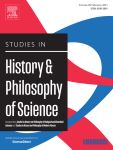The image shows why the patchwork of „cortical column“ failed to identify a cortical building block in the brain - drawing on the idea of blurry objects of research by @ufeest.bsky.social .
Now onwards to sending the manuscript out to publishers! (2/2)
#philsci #edusky #neuroskyence #cogsci
20.02.2026 18:21 — 👍 1 🔁 0 💬 0 📌 0

Image showing several uses of the term „cortical column“ and how it failed to bring a building block in the brain into focus for neuroscientists: the term does not describe discrete functional unit, but various kinds of structures in specific domains that vary in functional significance.
Finished last revisions my book „The Conceptual Fabric of Science“ - this is an image from the chapter on the epistemic utility of patchwork concepts for describing, classifying or explaining phenomena. (1/2)
20.02.2026 18:21 — 👍 12 🔁 1 💬 1 📌 0
Bd. 12 Nr. 2 (2025): Zeitschrift für Praktische Philosophie
| Zeitschrift für Praktische Philosophie
Die neue Ausgabe der Zeitschrift für Praktische Philosophie (ZfPP) ist raus und damit der von Joseph Conrad, Stefan Knauss und mir herausgegebene Schwerpunkt "Die Klimakrise und die Praktische Philosophie". Hier ist der Link zur Ausgabe. Ich werde die Beiträge auch sukzessive einzeln posten.
06.02.2026 13:00 — 👍 24 🔁 10 💬 1 📌 1
Mega spannend! Aber sollte es hier nicht „mit Karen Barad“ anstatt „pace“ heißen?
09.02.2026 13:26 — 👍 1 🔁 0 💬 1 📌 0
The Sixth Biennial Conference of the East European Network for Philosophy of Science - Sciencesconf.org
Home
There are 10 days left to submit a proposal for the 6th Biennial EENPS Conference (Bucharest, 18–19 September 2026).
Submission deadline: 15 February!
Talks and symposia across all areas of philosophy of science are welcome ☀️
eenps2026.sciencesconf.org
#philsci
05.02.2026 08:53 — 👍 19 🔁 20 💬 0 📌 1

🔔 We're launching our Bluesky account today! Can you help us spread the word by retweeting this post? 😀
#Theoria #diamondopenaccessjournal
12.01.2026 15:49 — 👍 118 🔁 83 💬 0 📌 2
Call for Commentary Proposals - Metabolic considerations for cognitive modeling
Call for Commentary Proposals - Metabolic considerations for cognitive modeling
As a final reminder, the deadline for commentary proposals for our BBS target article, "Metabolic considerations for cognitive modeling," is next Tuesday, February 3. For details, follow the link. Please share if you can
@phaueis.bsky.social
#philsci #cogsky #CognitiveNeuroscience
28.01.2026 10:04 — 👍 12 🔁 10 💬 0 📌 0

Developing Concepts for Neuroscience: A Philosophical Toolkit
Whether and how concepts should be developed depends on the phenomena that neuroscientists aim to describe, classify, and explain. These epistemic goals shape when introducing novel terms like “defau...
Paper on developing concepts for neuroscience now published open access:
doi.org/10.1111/ejn....
We argue that the success and failure of concepts fundamentally depends on epistemic goals.
#cogsky #neuroskyence #cognitiveneuroscience #philsky #philsci #philosophysky #cogsci
21.01.2026 15:49 — 👍 20 🔁 6 💬 0 📌 1
such as describing, classifying and explaining phenomena in the brain. We use examples like „default mode network“, „cortical column“ and „hierarchy“ to show when developing concepts succeeds or fails to advance our understanding of the brain (2/2)
#neuroskyence
#philsky
#edusky
#cogsci
12.01.2026 15:24 — 👍 2 🔁 1 💬 0 📌 0

Image shows a brain, with arrows going from epistemic goals to three boxes labeled introducing concepts, revising concepts and retiring/revising concepts, because the goals shape when these forms of developing concepts succeed or fail to advance our neuroscientific understand the brain.
My paper on
„Developing concepts for neuroscience: a philosophical toolkit“ with Daniel Margulies was just accepted for publication @ejneuroscience.bsky.social
We argue that the success and failure of concepts to understand the brain fundamentally depends on our epistemic goals (1/2)
12.01.2026 15:24 — 👍 15 🔁 2 💬 1 📌 0
The Deadline for Commentary Proposals for our target article, "Metabolic considerations for cognitive modeling," is Tuesday, February 3, 2026. For details, follow the reposted link below:
@phaueis.bsky.social
#philsci #cogsky #CognitiveNeuroscience
26.12.2025 22:30 — 👍 12 🔁 7 💬 0 📌 0
Call for Commentary Proposals - Metabolic considerations for cognitive modeling
Call for Commentary Proposals - Metabolic considerations for cognitive modeling
The call for commentary proposals for @phaueis.bsky.social and my BBS target article is now posted. It appears that one can download the preprint via this page. Think about it:
08.12.2025 22:44 — 👍 7 🔁 3 💬 0 📌 1

Bei Gehirnmodellen den Stoffwechsel mitdenken
MCMP-Studie: Kognitive Theorien sollten metabolische Grenzen berücksichtigen
For German speakers, LMU just posted a press release on our BBS target article „Metabolic considerations for cognitive modeling“
www.lmu.de/de/newsroom/...
#cogsky #neuroskyence #philsky #philsci
19.11.2025 14:01 — 👍 5 🔁 0 💬 0 📌 1
Metabolic considerations for cognitive modeling | Behavioral and Brain Sciences | Cambridge Core
Metabolic considerations for cognitive modeling
#philsci #cogsky #CognitiveNeuroscience
@phaueis.bsky.social and I have had our paper, “Metabolic considerations for cognitive modeling,” accepted as a target article in Behavioral and Brain Sciences.
www.cambridge.org/core/journal...
18.11.2025 11:58 — 👍 32 🔁 12 💬 4 📌 1
Metabolic considerations for cognitive modeling | Behavioral and Brain Sciences | Cambridge Core
Metabolic considerations for cognitive modeling
You can access the preprint here: doi.org/10.1017/S014...
Also, consider writing a commentary if this falls in your area of expertise! (3/3)
#neuroskyence
#philsky
#philsci
18.11.2025 16:40 — 👍 10 🔁 1 💬 1 📌 0
Our philosophical framework has foundational implications for psychological models of mental effort, medium independence of computation and comparing biological cognition and AI (2/3)
18.11.2025 16:40 — 👍 9 🔁 1 💬 1 📌 0
Very exciting news to share! Me and @davidcolaco.bsky.social published a target article in BBs on metabolism and cognition! We argue that models of cognition should incorporate metabolism - either to evaluate if existing models are biologically plausible, or to generate new models (1/3)
18.11.2025 16:40 — 👍 32 🔁 5 💬 1 📌 1

A chalkboard showing a patchwork model of the gene concept. On the left is the classical gene patch, with the technique of cross-breeding, scale of whole organisms, and the property of patterns of inheritance. On the right is the molecular gene patch, with X Ray crystallography as technique, the molecular scale and the property of DNA. The patches partially overlap because the DNA is involved in intergenerational inheritance between parent and offspring, but also explains how proteins are produced while offspring develops.
This is why it’s fun to teach on your research: today we discussed a chapter of my book on patchwork concepts in science. The students asked if we try can build a patchwork, and so we used the case of “gene“ from the previous session, which I hadn’t analyzed explicitly before!
#philsci
29.10.2025 20:36 — 👍 14 🔁 0 💬 1 📌 0
This is also a live debate in philosophy of science about eliminativism vs. pluralism regarding concepts with multiple meanings
Attention and emotion are both cases
press.uchicago.edu/ucp/books/bo...
link.springer.com/article/10.1...
17.09.2025 18:46 — 👍 3 🔁 0 💬 0 📌 0
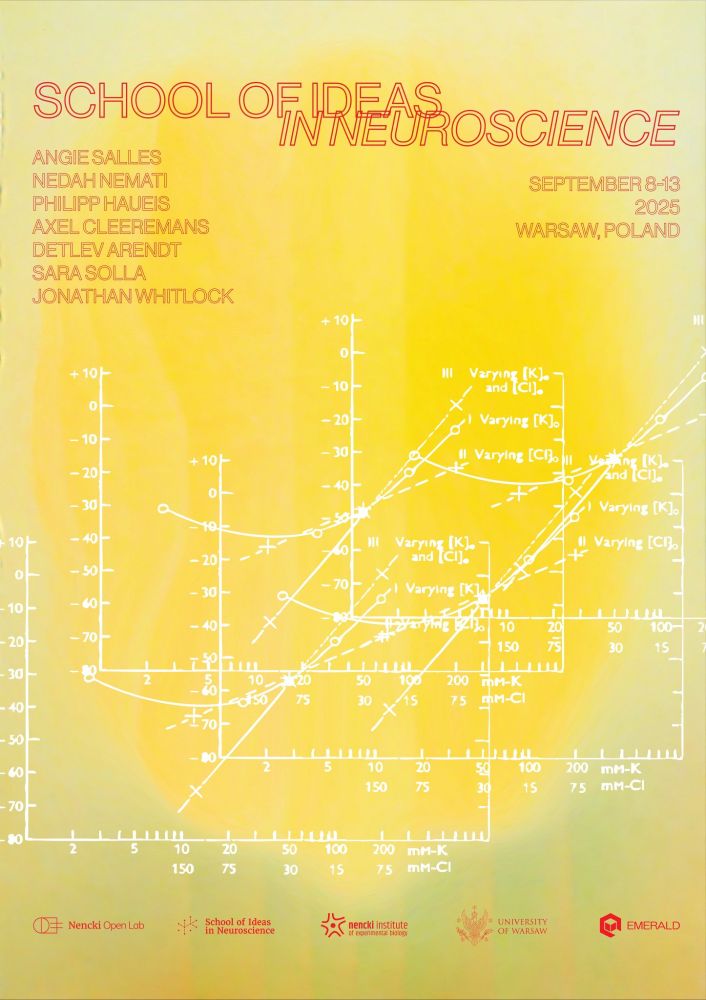
The deadline is approaching! We wait for your applications till Monday, July 21st!
17.07.2025 10:21 — 👍 12 🔁 9 💬 1 📌 2
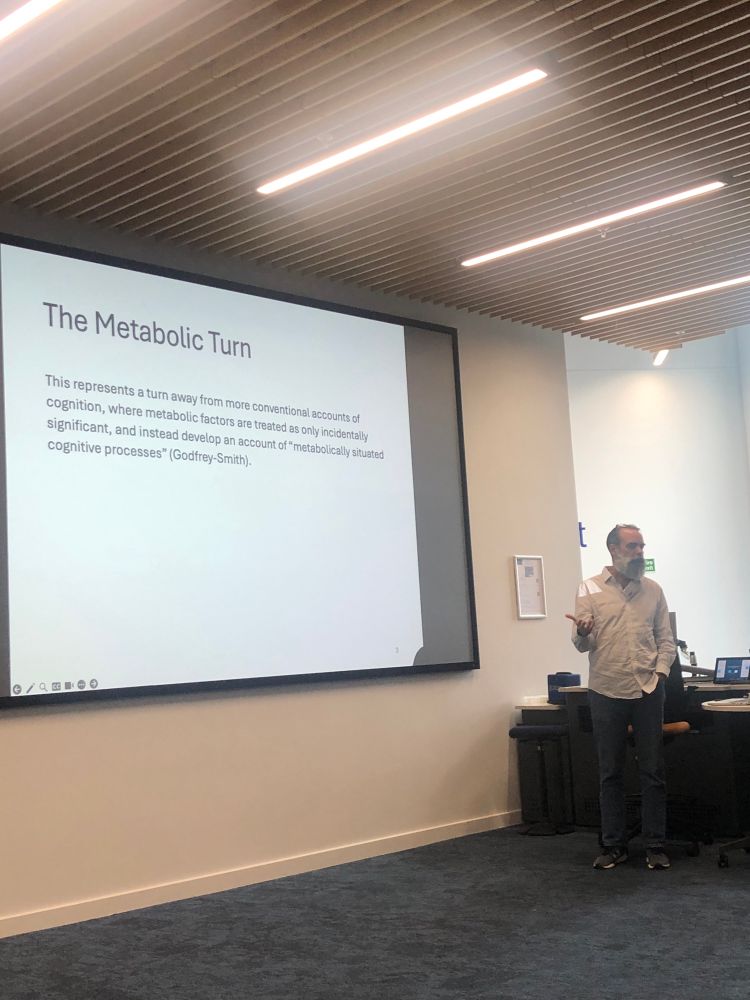
Philosopher Patrick McGivern, wearing a white shirt and blue jeans, explaining the „metabolic turn“, i.e. the importance of metabolism for understanding cognition
Finally, Patrick McGivern pronouncing the Metabolic Turn in philosophy of cognition, with work on the role of metabolism for non-neural cognition, such as bacteria chemotaxis (4/4)
Thanks to all speakers and participants for the great Q&A!
#philsky
#neuroskyence
#cognition
#metabolism
16.07.2025 18:35 — 👍 5 🔁 0 💬 0 📌 0
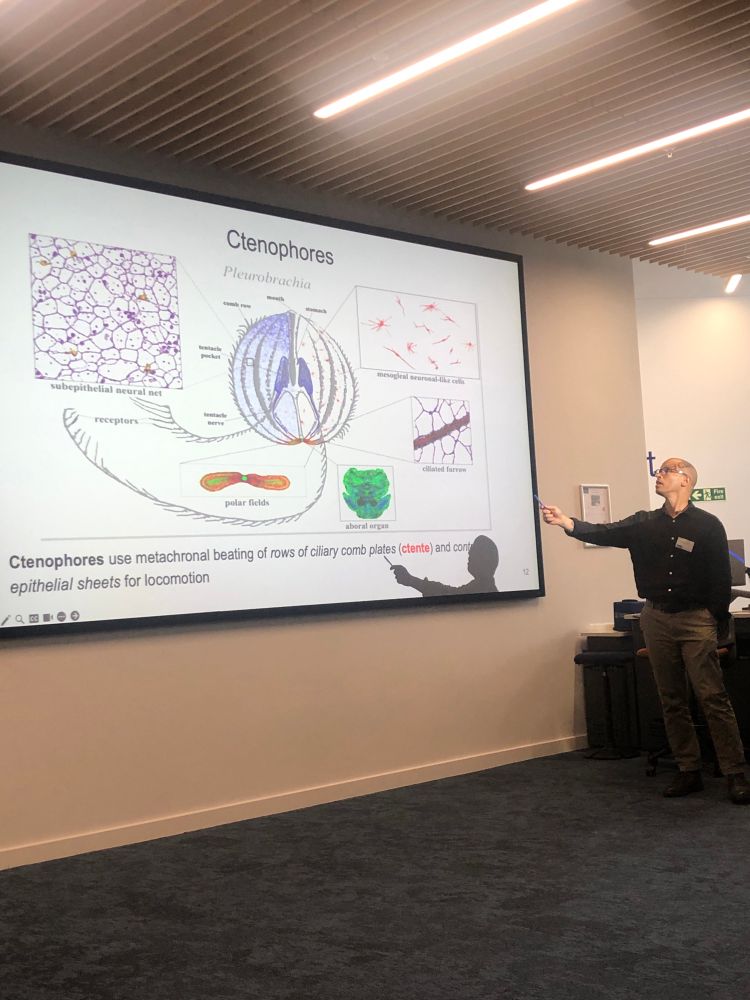
Philosopher Matthew Sims, wearing a black shirt and beige pants showing a slide on ctenophores, a creature with external passive sensory receptors and epithelial sheets for locomotion
Turning to evolution, Matthew Sims (in joint work w Marta Halina) explained how predictive brain models may have evolved from corollary discharge, which itself resulted from the need to distinguish external input from sensory feedback once nervous systems relied on sensorimotor integration (3/4)
16.07.2025 18:35 — 👍 5 🔁 0 💬 1 📌 0
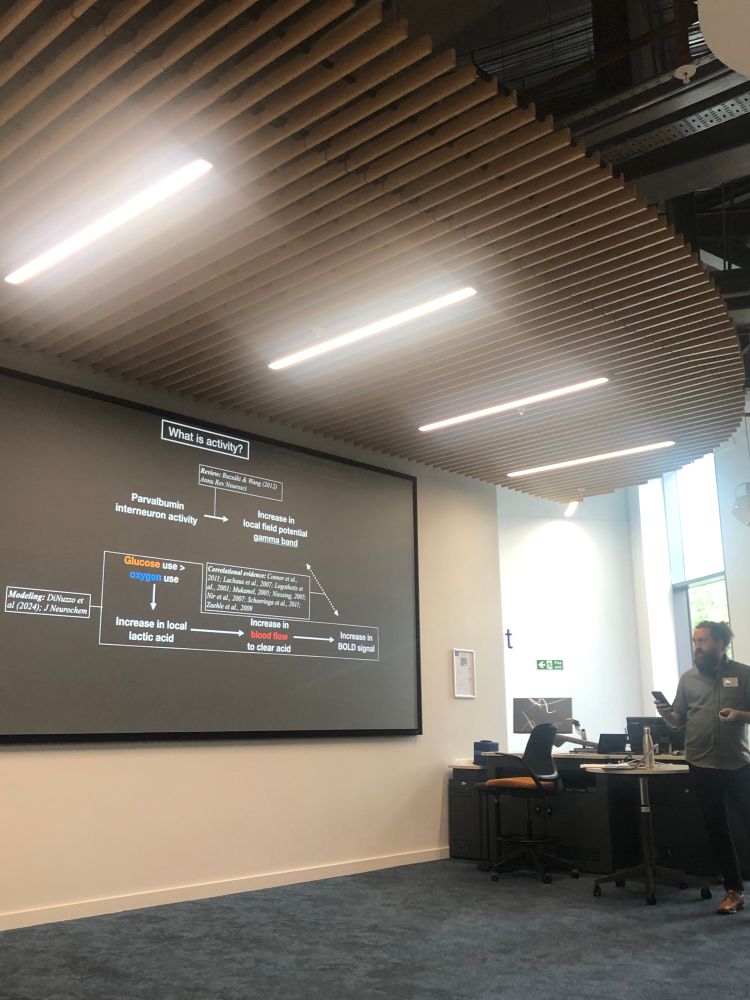
Neuroscientist Jordan Theriault wearing a blue shirt and black pants pointing at a slide that shows the relation between glucose metabolism and signals measured with functional magnetic resonance imaging.
Next was a talk by @jtheriault.bsky.social presenting a metabolic model of „activity“ in neuroimaging, suggesting that stimulus elicited BOLD responses Track prediction error processing in the brain, but not baseline metabolic load related to processing predictions (2/4)
16.07.2025 18:35 — 👍 2 🔁 0 💬 1 📌 0
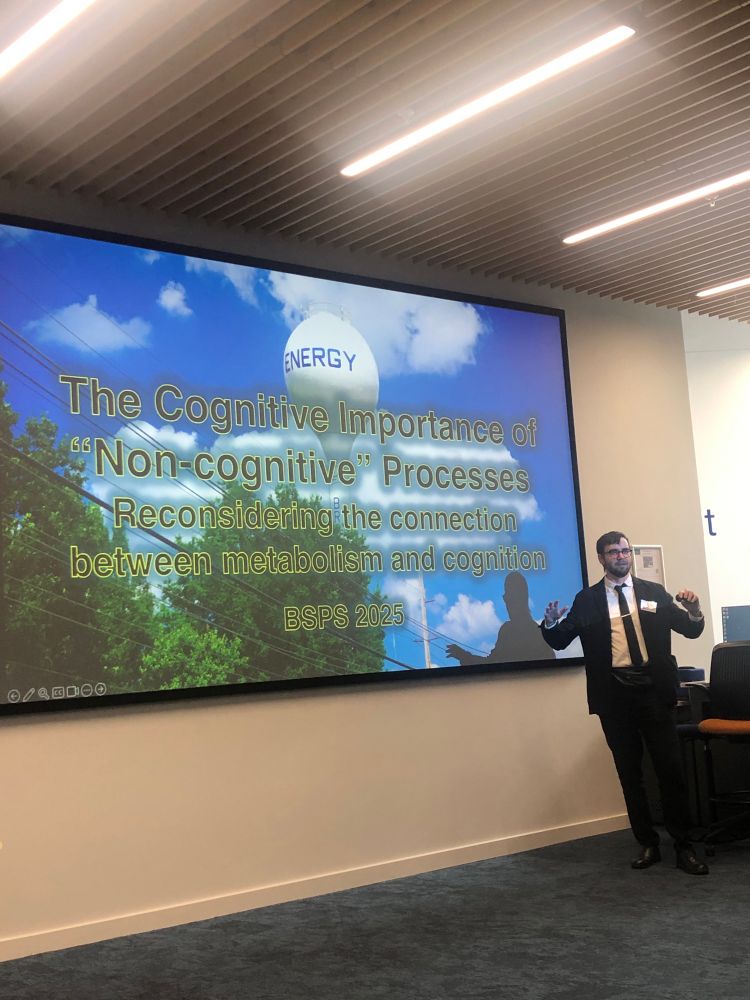
Philosopher David Colaço, eating a black suit jacket, white shirt and black tie in front of an image with a white balloon with „energy“ written in blue, a blue sky and white clouds on the back, some green tree canopies in front.
Had a great session on the relation between metabolism and cognition at BSPS Glasgow, organized by @davidcolaco.bsky.social . We presented joint work on using metabolism to constrain and generate cognitive models (1/2)
16.07.2025 18:35 — 👍 7 🔁 3 💬 1 📌 0
JUnQ – Journal of Unsolved Questions | GSE Mainz
There’s also the Journal of Unsolved questions that only accepts failed experiments etc
www.mainz.uni-mainz.de/activities/j...
02.07.2025 06:02 — 👍 10 🔁 0 💬 0 📌 0
Agreed! I’m usually skeptical of edited volumes,but could see the value here bc many will know failure cases from their respective disciplines
02.07.2025 05:59 — 👍 2 🔁 0 💬 0 📌 0
Author of DEMAND THE IMPOSSIBLE, amzn.to/45LFzNg, PRACTICAL EQUALITY, AMERICA’S FORGOTTEN CONSTITUTIONS, ELOQUENCE & REASON | Next: BATTLE FOR THE SOUL OF COAL COUNTRY | Prof @ Boston U | constitutionalism, legal history | https://linktr.ee/roberttsai
PhD Humanities: Aerial Perspectives; Landscape Traditions; Operational Images; Critical AI; AI Slop & Visual Culture; Surveillance Studies; Also Art Criticism; Definitely Coffee. Professoring in the gig economy.
Independent, daily global news hour.
Support our work: http://democracynow.org/donate
Daily News Digest: http://democracynow.org/subscribe
Exploring our world's diverse forms of mind—human, animal, machine—from diverse perspectives. A project of @divintelligence.bsky.social, @kensycoop.bsky.social, @laukas.bsky.social
www.disi.org/manyminds/
Account of the Computational Cognitive Science Lab at Donders Institute, Radboud University
Physics Professor, NMBU & University of Oslo. Host of two podcasts: Theoretical Neuroscience Podcast (http://theoreticalneuroscience.no) & Vett og vitenskap (http://vettogvitenskap.no). Likes brain physics and Sunderland football club.
Neuro, AI, chips @ Imperial & Cambridge.
www.danakarca.com
Computational neuroscientist at Imperial College. I like spikes and making science better (Neuromatch, Brian spiking neural network simulator, SNUFA annual workshop on spiking neurons).
🧪 https://neural-reckoning.org/
📷 https://adobe.ly/3On5B29
🤠 Philosopher at Purdue 🤓
• Mind, neuro, cognitive science, AI •
Follow these accounts for Phil science of the mind + brain related stuff:
🧠 @socphilneuro.bsky.social &
🎂 @caic-at-purdue.bsky.social
📚 daniellejwilliams.com
The University of Chicago Press is one of the oldest and largest university presses in the United States and a distinguished publisher of trade and scholarly books and journals. Refining minds since 1891!
Connecting philosophers working in the mind and brain sciences around the world http://ispsmind.com/
Team: Marco Facchin, Liberty Severs, Valeria Becattini, Laura Oppi, Jimena Clavel, Carlos Barth, April Owens.
Acc. managed by @libertysevers.bsky.social
Assistant professor at MIT, Department of Linguistics and Philosophy. Philosophy of science and cognitive science of consciousness.
Assistant Professor in Philosophy of AI at Umeå University, working on and at the foundations of the sciences of mind and cognition.
Searchable through tootfinder.
[bridged from https://social.sunet.se/@dcm on the fediverse by https://fed.brid.gy/ ]
Philosophy and Psychology professor at University of Cincinnati. Embodied cognition, AI, social cognition, phenomenology, critical theory. Against fascism. (he/him)
New book: https://cup.columbia.edu/book/intertwined-creatures/9780231223195/
An archive for preprints in philosophy of science. This is an automated feed of new uploads. More info & contact: https://philsci-archive.pitt.edu/
A blog devoted to exploring and promoting the great diversity that exists in the study of language, in the past and today.
https://hiphilangsci.net
Posts by: @teapotlinguist.bsky.social
Permanent researcher in philosophy of biology. Interested in cancer biology and associated concepts and theories.
Interdisciplinary research lab, Center for Mind/Brain Sciences #CIMeC
PI: Albrecht Haase | #Neuroscience | #QuantumBiology | #Olfaction | #Vision | #Magnetoreception | #CalciumImaging | #Insects | #Honeybees | #UniTrento https://r.unitn.it/en/cimec/nphys
I'm a Professor of Philosophy of Science at the Institute for Science in Society, Radboud University, of which I am currently director. My research centers around the notion of scientific understanding. @isis-radboud.bsky.social














